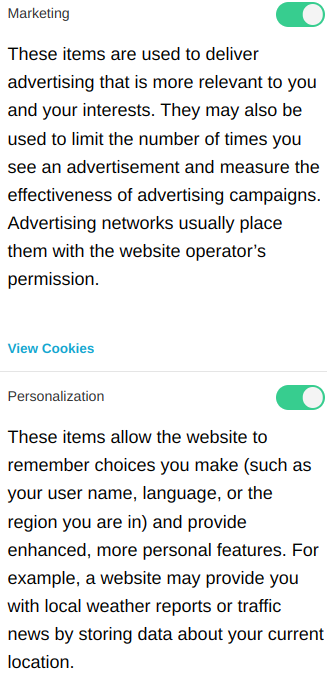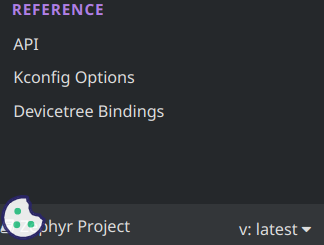-
Notifications
You must be signed in to change notification settings - Fork 8.2k
doc: add cookie consent to generated HTML pages #54723
New issue
Have a question about this project? Sign up for a free GitHub account to open an issue and contact its maintainers and the community.
By clicking “Sign up for GitHub”, you agree to our terms of service and privacy statement. We’ll occasionally send you account related emails.
Already on GitHub? Sign in to your account
Conversation
Adding CSS and JS code for making sure users opt-in to cookies related to Google Analytics. Fixes issue zephyrproject-rtos#51604. Signed-off-by: Benjamin Cabé <[email protected]>
There was a problem hiding this comment.
Choose a reason for hiding this comment
The reason will be displayed to describe this comment to others. Learn more.
The placement of the "cookie preferences" button seems questionable.
Also, some concerns/questions:
- I am not seeing the "GDPR banner" being displayed on the first visit. Is this solution GDPR-compliant? (IIUC, displaying a banner listing cookie preference options is the norm, if not required for GDPR compliance?)
- We have "Marketing" and "Personalisation" cookie choices. Does this really make sense for an open source project documentation website?

Fair point. I can look into tweaking the CSS.
Did you try in "incognito" mode? The cookie consent works across all LF websites, so you might have given consent elsewhere?
I agree this can be confusing. We could use a custom cookie consent script as opposed to the generic LF one to address that. |
|
I would like someone to justify having a 3rd party tracker built into our technical documentation. What is the purpose and what is the gain for the project? |
Agreed, was this ever agreed by the TSC? |
There was a problem hiding this comment.
Choose a reason for hiding this comment
The reason will be displayed to describe this comment to others. Learn more.
Leaving a -1 for pending question that needs answering.
I believe the statement made here still applies #16666 (comment).
FWIW, I would be happy to look into using another web analytics platform post 3.3, potentially a self-hosted one, if Google Analytics is part of what people are having an issue with. |
I mean, let's be honest, the search on the documentation is probably the worst search system I've had the misfortune of using, it returns nonsense results, completely unrelated results - and if it does actually return what I'm looking for, sometimes it's way down the page. I usually find it faster to go and clone the repo and do a grep than trying to find the right term that will find what I'm looking for unless I put in the exact text as it appears - so tell me, how is an analytics engine going to explain this (quite common) frustration of use to you?
Why would you be checking what links people take to the documentation?
So not bothering to do the simple thing of just asking people what they think and instead trying to work out their opinion of the documentation through analytics? Well that's sold me. |
Agreed, and it's my intention to look at tweaking the search "scorer" to improve the quality of the search results.
Even if it's broken, people are using it. And looking at the search terms (again, whether the search ends up being successful or not due to poorly ranked results) is IMO valuable, to me at least.
I think I already answered in my previous comment. Examples would be finding active open source projects that "build on" Zephyr, training material being put together by folks, etc. I am not saying that this will ever replace doing everything we (I) can to make sure people know where to find us and let us know about those things, but in my experience complementing this with a look at our inbound traffic is usually very helpful in eventually onboarding people who hadn't realized otherwise they could get more engaged.
Define "people" :) For better or worse, there will always be downstream adopters of Zephyr that just "consume" whatever is being put out there, and provide hardly any feedback. I definitely plan on trying to find ways to encourage people to participate more, but in the meantime "asking people" might only get us the feedback from people already engaged, or at least already well past their "hello world" and their first time landing on the docs homepage. |
Those are both interesting data points, but is a full 3rd party analytics package really needed to find this? Couldn't this be found simply by offline analyses of the httpd logs?
Again, couldn't this be found by static analyses of the httpd server logs looking for the referrer? |
Except you don't know how reflective these are of real results, anyone blocking these analytics locally or by their network (and given that Europe is the area with the greatest restrictions, we can assume most people blocking them would be in that area) search terms would not appear, so you're seeing what could actually be a completely false view of the data.
Well let's start with this question: when and where have people - i.e. anyone - been asked for their feedback on the documentation? And in regards to referrer tracking, firefox at least has blocked that for a number of years now, so what you would get would be nothing or worthless, would assume other browsers have done similar. |
|
No longer relevant after #54875 |


Adding CSS and JS code for making sure users opt-in to cookies related to Google Analytics. Fixes issue #51604.
Signed-off-by: Benjamin Cabé [email protected]
Fixes #51604